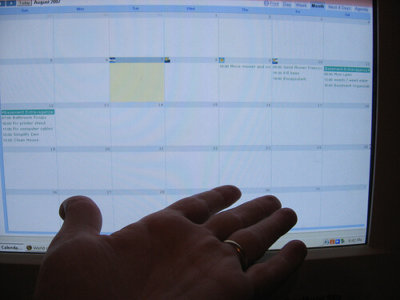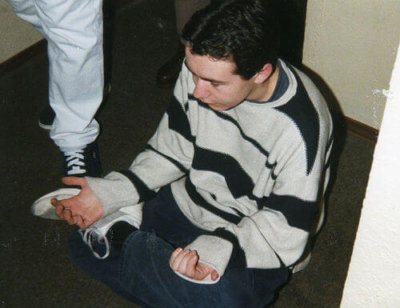Managing Adult ADHD – 5 Self-Help Tools

By: Rico Marcelli
by Andrea M. Darcy
While medication is the first line of treatment for adult ADHD in the UK, not everyone chooses this route. And there are other options for managing Adult ADHD, such as working with an ADHD therapist (read our article on drug-free options for treating adult ADHD for more information).
Medication or not, you still have to work to adjust your habits from a lifetime with attention deficit disorder.
What can you do to support yourself alongside your treatment plan?
[Not sure you do or don’t have ADHD? Read our article ‘Do You Have Adult ADHD?’, and also consult our comprehensive guide to ADHD.]
5 Ways of Managing Adult ADHD
1. Structure.
Yes, structure can be a bad word to those with ADHD that leaves you instantly feeling trapped. Many people with ADHD are also creative, with freelance careers where structure can be seen as ‘too conservative’.
It’s important to ask good questions about your own feelings of being ‘anti-structure’. When in your life did this feeling start? It’s not uncommon that it’s a hangover from school, where perhaps your ADHD was not recognised and instead you were put down or even punished for not being ‘good’ at structure, for handing in assignments late or not being on time for class.
As an adult, you are free to make structure a positive. What forms of structure could keep you on track and make life smoother?
- Would working with a PA once a week keep you organised?
- Or a ‘co-working’ environment see you less distracted then working from home?
- What about other areas of your life besides work? Social life? Family life?
- Could you workout with a friend so your weekly hits of focus-inducing serotonin are scheduled in advance?
- Can you make dinner the same time every Friday so you can’t forget what time you promised to be there?

By: Qfamily
2. Timing.
Do you live life in a constant rush? Or often have the sense that time just ‘slipped away from you?’ It’s common for those with ADHD to completely misjudge how long things actually take.
A simple yet seriously revealing experience can be to spend a week very closely monitoring your time usage. (You need a timer, but don’t use the one on your phone – those apps are just too distracting).
Time all activities you mindlessly do. How long do you actually spend doing your makeup? Preparing dinner? Otherwise, set an alarm to go off on the hour, every waking hour. Each time the alarm goes off check in with what you have done in the last hour and what needs to be done in the next one.
It’s eye opening to see how some things are accomplished way faster than you knew, and others need a much bigger ‘time vessel’. After a week you will have a clear idea of how to allocate time differently, which can lead to stress levels lowering dramatically.
The bonus is that the alarm going off on the hour can stop many a distraction ‘spiral’, acting like a constant call to mindfulness -which is the very reason why some who try this continue using this tactic for their working days.
3. Mindfulness meditation.

By: Ben Sutherland
Speaking of mindfulness… yes, it’s a trend. But meditation is also an incredible tool for managing ADHD in and of itself.
A now oft-quoted 2008 study on mindfulness for adult ADHD saw an astounding 78% of participants reporting reduction in their symptoms. Of course it’s only fair to note that the study only had 32 participants.
BYet other studies have since supported the results. An interesting study carried out at Yale in 2011 looked at the effects of mindfulness meditation on the default mode network (DMN) in the brain, associated with attention difficulties. Mindfulness meditation was found to ‘reasonably deactivate’ the DMN, leading to improved focus and better moods to boot.
[not completely clear what mindfulness really is? Read our complete guide to mindfulness].
4. Accountability.
Having someone keep you accountable with goals when managing your adult ADHD sounds wise. But it can quickly can go wrong and lead to distracted socialising if not used correctly.
It’s advisable to again use structure and that timer with your ‘accountability partner’. Make the days and times you check in with each other consistent, have a structure to your meetings, and time how long each person talks.
Or consider using an ADHD coach or ADHD therapist. Both are trained to not just keep you on track, but to also help you learn and put into practise new ways of managing distraction.
Think twice about using a partner or spouse for accountability. ADHD causes its own set of strains on relationships, and adding another power dynamic to the mix might not be in your own best interests.
5. Own the distraction.
Speaking of distractions… the bane of life with ADHD. Their lure is often that they have a ‘forbidden’ sense to them, like watching bad TV, or reading trashy celebrity news online.
It can be interesting to actually schedule in such distractions. ‘Owning’ them like this can lessen their power. For example, commit to an hour of celebrity news twice a week, and yes, time it. You might find you actually can’t wait for the hour to end so you can get back to writing that paper.
Harley Therapy provides both adult ADHD diagnoses with a specialised ADHD psychiatrist as well as ADHD therapy.
Do you have a tactic for living with adult ADHD you’d love to share? Please do so in the comment box below.

Andrea M. Darcy is a mental health and wellbeing expert and writer. She also runs a consultancy helping people find their perfect therapy and therapist. She was diagnosed with ADHD over 25 years ago so knows a thing or two about managing it, these are the tools she uses! Follow her on Instagram for useful life tips @am_darcy




